SWEDISH
SOUTH ASIAN STUDIES NETWORK
Newsletter 69:
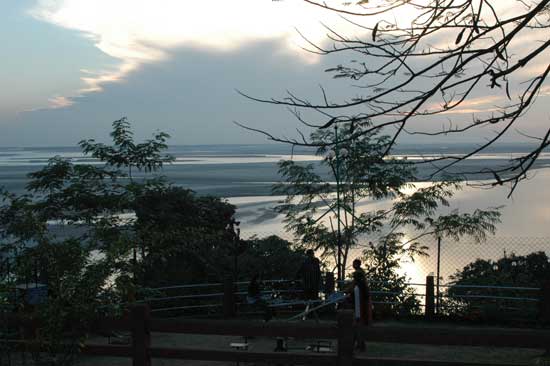 9
January
2007
9
January
2007
| SASNET News | Educational News |
| Research Community News | |
| Conferences and workshops | Important lectures and seminars |
| Cultural activities | Politics and Business |
| New items on the web site | |
• Report from the Stockholm
workshop
 SASNET
successfully held a workshop on the "Role of South Asia in the Internationalisation
of Higher Education in Sweden" at Nobel Forum, Karolinska Institutet
in Stockholm 28-29 November 2006. It was jointly organised by SASNET, Karolinska
Institutet Medical University and the Swedish Institute, and involved sessions
with representatives from 20 Swedish universities, and from the International
Programme Office for Education and Training; the Swedish National Agency
for Higher Education; STINT; the Government ministries of Education and
Foreign Affairs; and the South Asian embassies in Stockholm. The workshop
focused on experiences from masters and PhD programmes in Sweden as well
as in South Asia, with an aim to promote increased academic exchange with
South Asia.
SASNET
successfully held a workshop on the "Role of South Asia in the Internationalisation
of Higher Education in Sweden" at Nobel Forum, Karolinska Institutet
in Stockholm 28-29 November 2006. It was jointly organised by SASNET, Karolinska
Institutet Medical University and the Swedish Institute, and involved sessions
with representatives from 20 Swedish universities, and from the International
Programme Office for Education and Training; the Swedish National Agency
for Higher Education; STINT; the Government ministries of Education and
Foreign Affairs; and the South Asian embassies in Stockholm. The workshop
focused on experiences from masters and PhD programmes in Sweden as well
as in South Asia, with an aim to promote increased academic exchange with
South Asia.
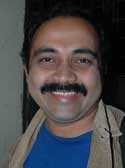 Most
of the workshop presentations are now available on our web site as pdf-files.
They include Mr. Sunandan Roy Chowdhury’s (photo to the right) provocative
keynote presentatIon, titled ”The Moffusil and
the Metropolitan – Higher Education’s Meandering Paths”.
In addition
to this, Jan Magnusson (a key person behind the creation of SASNET seven
years ago and now a member of SASNET’s
board) has written a report, summarizing the two-day workshop sessions. Read
the workshop report.
Most
of the workshop presentations are now available on our web site as pdf-files.
They include Mr. Sunandan Roy Chowdhury’s (photo to the right) provocative
keynote presentatIon, titled ”The Moffusil and
the Metropolitan – Higher Education’s Meandering Paths”.
In addition
to this, Jan Magnusson (a key person behind the creation of SASNET seven
years ago and now a member of SASNET’s
board) has written a report, summarizing the two-day workshop sessions. Read
the workshop report.
• Anna
Lindberg appointed new SASNET Director
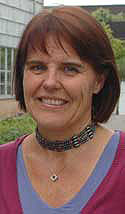 On
Wednesday 20 December 2006, Lund University Vice-Chancellor (VC) Göran
Bexell decided to appoint Assistant Professor Anna Lindberg (photo
to the right), Department of History, Penn State University,
USA, as Director/Coordinator for SASNET on a 50 % basis from 1 July
2007 to 31 December 2009. In Sweden Anna Lindberg has been affiliated
to the Dept. of History, Lund University, where she defended her
doctoral dissertation about
”Experience and Identity: A Historical Account of Class,
Caste, and Gender among the Cashew Workers of Kerala, 1930-2000” in
2001. More information about Dr. Lindberg
and her research.
On
Wednesday 20 December 2006, Lund University Vice-Chancellor (VC) Göran
Bexell decided to appoint Assistant Professor Anna Lindberg (photo
to the right), Department of History, Penn State University,
USA, as Director/Coordinator for SASNET on a 50 % basis from 1 July
2007 to 31 December 2009. In Sweden Anna Lindberg has been affiliated
to the Dept. of History, Lund University, where she defended her
doctoral dissertation about
”Experience and Identity: A Historical Account of Class,
Caste, and Gender among the Cashew Workers of Kerala, 1930-2000” in
2001. More information about Dr. Lindberg
and her research.
At its meeting in late August 2006, the SASNET board recommended the
VC to appoint Dr. Lindberg for the position already from 1 January 2007.
However, on 9 November the Vice-Chancellor decided to extend the appointment
of Prof. Staffan Lindberg for another six months, to remain as Director/Coordinator
of SASNET until 30 June 2007.
• New
Board for SASNET from 1 January 2007
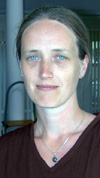 On
Thursday 9 November 2006, Lund University Vice-Chancellor Göran
Bexell decided the new composition of SASNET’s board from 1 January
2007 to 31 December 2009. The board will be chaired by Associate Professor
Gunnel Cederlöf
(photo to the left), Dept. of History,
Uppsala University. Besides her, the board consists of three representatives
for Lund University (that funds SASNET with a third of its budget),
two representatives for other Swedish universities, one representative
for PhD candidates, one representative for other Nordic universities,
and one representative for Swedish NGOs. The new board will have its
first meeting in Lund on Monday 29 January 2007. Full
information about the new board.
On
Thursday 9 November 2006, Lund University Vice-Chancellor Göran
Bexell decided the new composition of SASNET’s board from 1 January
2007 to 31 December 2009. The board will be chaired by Associate Professor
Gunnel Cederlöf
(photo to the left), Dept. of History,
Uppsala University. Besides her, the board consists of three representatives
for Lund University (that funds SASNET with a third of its budget),
two representatives for other Swedish universities, one representative
for PhD candidates, one representative for other Nordic universities,
and one representative for Swedish NGOs. The new board will have its
first meeting in Lund on Monday 29 January 2007. Full
information about the new board.
• More information about SASNET and its
activities
See SASNET’s page, http://www.sasnet.lu.se/sasnet.html
• Doctoral
dissertation in Uppsala about Vallabha's Nyayalilavati
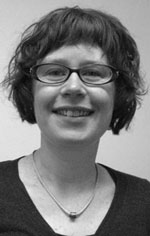 Anna-Pya Sjödin, Section
of South Asian Languages and Cultures, Department of Linguistics
and Philology, Uppsala University, will defend her doctoral dissertation in
Indology titled "The Happening of Tradition. Vallabha on Anumana
in Nyayalilavati" on Saturday 13 January
2007, 10.00. It consists of a translation and analysis of a medieval
Indian text based on certain theoretical considerations on cross-cultural
translation and the understanding of tradition. Faculty opponent will
be Professor Purushottama Bilimoria, School of International and Political
Studies, Deakin University, Melbourne, Australien. Venue: Geijersalen,
Humanistiskt centrum, Engelska parken. More
information, with access to full thesis.
Anna-Pya Sjödin, Section
of South Asian Languages and Cultures, Department of Linguistics
and Philology, Uppsala University, will defend her doctoral dissertation in
Indology titled "The Happening of Tradition. Vallabha on Anumana
in Nyayalilavati" on Saturday 13 January
2007, 10.00. It consists of a translation and analysis of a medieval
Indian text based on certain theoretical considerations on cross-cultural
translation and the understanding of tradition. Faculty opponent will
be Professor Purushottama Bilimoria, School of International and Political
Studies, Deakin University, Melbourne, Australien. Venue: Geijersalen,
Humanistiskt centrum, Engelska parken. More
information, with access to full thesis.
• Articles on South Asian
languages wanted for anthology
Dr. Aswini Kumar Mishra and Dr Jugal Mishra in Bhunaneshwar,
India, are currently editing a volume on South Asian languages. They
request scholars in the line to contribute with articles for inclusion
in the coming anthology. The focus should be on any language spoken by
a large number of people in South Asia. It should either spell out theoretical
aspects or practical applications as the case may be. Last date for submission
of texts is 31 January 2007. More
details on request to Aswini Kumar Mishra.
• Papers invited for the Oxford
Development Studies journal
The Oxford
Policy Institute (OPI) is inviting proposals for papers to be presented
at a sponsored meeting and submitted to the Oxford
Development Studies journal for publication. The papers
should focus on one of the following topics: • What matters for
good government?; • What determines the performance of public
administrations?; and • What determines the quality of public
services? OPI will commission one paper on each topic. The papers are
expected to deliver a comparative, evidence-based analysis of how political,
economic, organisational or social institutions and their associated
incentives and sanctions shape public sector performance and the quality
of public services in different settings. Proposals should be sent
to goodgovernment@opi.org.uk by
16 February 2007.
• More information about South Asia related
research at Swedish and Nordic universities
See SASNET’s page, http://www.sasnet.lu.se/research.html
• Course
on Changing India and Ourselves for teachers training students in Stockholm
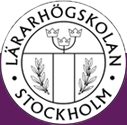 The
Dept of Teaching processes, Communication and Learning (UKL) organises
a 10 credits (15 ECTS) course titled ”Changing India and Ourselves” during
the Spring 2007 (January–March). The course consists of two parts,
first five weeks field studies in Tamil Nadu, India, where the students
should confront, analyse and reflect upon the various patterns of poverty
and domination that can be found in the South and in the relation to
the richer parts of the world; and then five weeks literature studies
and seminars in Sweden. The course has developed out of a course titled ”Changing
South” that Jim Walch has run at the department since 1993.
The
Dept of Teaching processes, Communication and Learning (UKL) organises
a 10 credits (15 ECTS) course titled ”Changing India and Ourselves” during
the Spring 2007 (January–March). The course consists of two parts,
first five weeks field studies in Tamil Nadu, India, where the students
should confront, analyse and reflect upon the various patterns of poverty
and domination that can be found in the South and in the relation to
the richer parts of the world; and then five weeks literature studies
and seminars in Sweden. The course has developed out of a course titled ”Changing
South” that Jim Walch has run at the department since 1993.
• Uppsala University introduces Masters
programme in Eurasian Studies
Beginning in the fall of 2007, a Master’s Program in Politics
and International Studies will be introduces at Uppsala University.
It will be offered jointly by the Department
of Eurasian Studies, the Department of Government and
the Department of Peace & Conflict Research.
The program runs over two years of full-time study, and may lead to the
award of a Master’s degree in Eurasian Studies, Political Science
or Peace and Conflict Studies. The program’s regional focus stretches
from the Balkans, via Eastern Europe, the former Soviet Union (including
the Caucasus and Central Asia), to China and Northeast Asia. Deadline
for applications: 15 April 2007.
• Time to apply for the 2007 Master’s
Programme in Development Studies
Uppsala University’s
60 ECTS-credits (40 Swedish points) Master’s
Programme in Development Studies again starts in September 2007.
The programme, partly focusing on South Asia, has been designed to
attract students with a special interest in development issues, and
might be useful for personnel working in the foreign services, aid
organisations, the UN, and non-governmental organisations. Deadline
for applications: 1 February 2007. More
information on the programme.
• Master's Programme
in Science for Sustainable Development at Linköping University
A
120 ECTS Credits International Master's Programme in Science for
Sustainable Development starts at
Linköping University in September 2007. It is organised by the
Faculty of Arts and Sciences, and leads to a Master in Science degree
in Sustainable Development, with a specialization in one of the following
areas: 1. Climate, Energy & Recycling;
2. Water & Food Security; or 3. GIS for Environmental Studies.
Focus in the first two study areas will be directed to both how social
changes shape the environment, and how environmental changes shape
society. Dr. Julie Wilk from
the Dept. of Water and Environmental Studies is
one of the programme coordinators. Deadline for applications: 1 February
2007.
• Indology and South Asia related languages courses
at Uppsala University
Every year, the Section
for Asian and African Languages and Cultures at the Dept. of
Linguistics and Philology, Uppsala University, offers
South Asia related courses and study programmes in Indology
(including Sanskrit), Hindi, Comparative Indo-European Philology,
and Iranian languages.
– Indology studies courses (including Sanskrit) are carried out up to D-level. A new 20 credits A-level course starts every Fall semester, and includes a 5 credits course in Sanskrit text applications, 10 credits Sanskrit grammar, and 5 credits Cultural history of India. The B level course runs during the Spring 2007 and includes courses in Sanskrit, Pali and Vedic languages . C-level courses also run during the Fall semesters.
Besides being part of the study programmes, 5 or 10 credits orientation courses are also offered every semester in topics such as ”Indian Religions, Culture and History”; ”Indian Languages and Literature”; ”Introduction to Sanskrit”; and ”Introduction to Indic Philosophical Traditions”. The latter course, run during the Fall 2006, involves studies about the Indic history of ideas (in present-day India, Pakistan, Bangladesh and Afghanistan) from the Vedas up to modern, postcolonial theories, but focusing on the Hindu, Buddhist, and Materialist traditions of ideas.– Hindi studies courses are carried out up to D-level. A new 20 credits A-level course started in the Fall 2006, and a B-level course is run during the Spring 2007.
– Comparative Indo-European Philology courses are carried out up to D-level. A new 20 credits A-level course started in the Fall 2006, and a B-level course is run during the Spring 2007. An individual 5 credits orientation course about ”Indoeuropean Languages” will also be organised in May 2007.– South Asia related Iranian languages courses. Within the realia courses on A- and C-level (arranged during the Fall semesters every year) the section for Iranian Languages includes studies on the culture and history of Afghanistan. On the D-level run during the Spring 2007, the study of Dari and Tajik languages is included.
• Ljungskile folk high school again
goes to Jagriti Vihara in the Fall 2007
A new World course (”Världens
kurs med Indienresa 2007”)
on Justice, Peace and Environment, including a three weeks
tour to north India, will be arranged by Ljungskile Folk High school
during the period 20 August – 20 December 2007. The tour includes
a three weeks stay at the village folk high school Jagriti Vihara in
Ranchi, Jharkhand. More
information.
• Biskops-Arnö organises
course on Ecology
and Global Solidarity with Framtidsjorden
 Nordens
Folkhögskola Biskops-Arnö organises yearly 36 weeks
courses on Ecology
and Global Solidarity. The current course started in August
2006, and includes a two months stay in India in January–February
2007, where the students will study local projects working against the
globalisation and for an ecologically and socially sustainable society.
A new course will start in late August 2007 and last until 23
May 2008. It will be carried out as a trainee programme in collaboration
with the Swedish NGO Framtidsjorden and
its network in Ladakh, India. The costs will be partly funded by Sida. More
information.
Nordens
Folkhögskola Biskops-Arnö organises yearly 36 weeks
courses on Ecology
and Global Solidarity. The current course started in August
2006, and includes a two months stay in India in January–February
2007, where the students will study local projects working against the
globalisation and for an ecologically and socially sustainable society.
A new course will start in late August 2007 and last until 23
May 2008. It will be carried out as a trainee programme in collaboration
with the Swedish NGO Framtidsjorden and
its network in Ladakh, India. The costs will be partly funded by Sida. More
information.
• SOIR builds community college
in Nepal in collaboration with Swedish folk high schools
The Swedish
Organisation for Individual Relief, SOIR (Individuell Människohjälp
– IM – in Swedish), based in Lund, is a development assistance organisation
started in 1938.
The organisation supports education, health and income-generating
projects in many countries throughout the world, including India
(especially among Tibetan refugees) and Nepal. In Nepal, SOIR since
40 years runs a school in the village Wahaki in Parbat, a remote
district of western Nepal. From February 2007 this school will be
expanded with new buildings, and within two years turn into a community
college, that will have an academic collaboration with two Swedish
folk high schools, Österlen folk high school in Tomelilla and
Helliden folk high school in Tidaholm. More
information about the project in a report by Janusz Lipinski,
SOIR Project Organiser (as a pdf-file, only in Swedish).
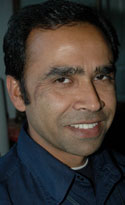 Students
participating in Österlen folk high school’s yearly
undergraduate social science courses on India/South Asia (more
information) will have the Wahaki college as their base
for field studies/research in Nepal already from this year.
SOIR has also employed Mr. Keshab
Bhattarai (photo to the right) as the organisation’s
representative in Nepal, in charge of the Wahaki college and
other projects that SOIR is engaged with in the country. Mr.
Bhattarai is affiliated to Lund University, where he is near
to complete a Masters degree in the Asian Studies programme
organised by the Centre
for East and South-East Asian Studies, ACE.
Students
participating in Österlen folk high school’s yearly
undergraduate social science courses on India/South Asia (more
information) will have the Wahaki college as their base
for field studies/research in Nepal already from this year.
SOIR has also employed Mr. Keshab
Bhattarai (photo to the right) as the organisation’s
representative in Nepal, in charge of the Wahaki college and
other projects that SOIR is engaged with in the country. Mr.
Bhattarai is affiliated to Lund University, where he is near
to complete a Masters degree in the Asian Studies programme
organised by the Centre
for East and South-East Asian Studies, ACE.
• Number of
Indian universities not enough according to National
Knowledge Commission
India
will need 1,500 universities to attain a gross enrolment ratio of at
least 15 per cent by 2015. This is a key observation made by the National
Knowledge Commission (NKC) in its note to the Prime Minister on higher
education. The
Hindu 2 January 2007. Go
for the article.
• More information about South Asia related
education at Swedish and Nordic universities
See SASNET’s page, http://www.sasnet.lu.se/education.html
Conferences and courses
• Political Cultures theme for the 12th
annual Cultural Studies Workshop in Hyderabad
The Centre for Studies
in Social Sciences (CSSSC) in Kolkata, India, in collaboration with
the Ford Foundation, ENRECA (Denmark) and SEPHIS (the Netherlands)
will hold its 12th annual Cultural Studies Workshop from
28 January 2006 to 2 February 2007, in Hyderabad, India. The broad
theme for this year’s workshop is ”Political
Cultures”. It is intended to give young researchers an opportunity
to share their work with senior scholars in the field, including some
of the faculty of the CSSSC. It is aimed at Indian doctoral or post-doctoral
students. International participants are also invited from countries
of the South: their airfare and local hospitality will be covered by
the CSSSC in collaboration with SEPHIS. More
information.
• Nordic workshop on War, Peace and
Development in Sri Lanka
A Nordic workshop on “War, Peace and Development
in Sri Lanka” is held in Göteborg 29–30 January
2007. The aim of the workshop is to bring together scholars
in the Nordic research environments working on issues related to the
violent and longstanding conflict in Sri Lanka, and in particular on
efforts for achieving peace and development. The primary focus is on
paper presentations of the participants own research. The workshop
will provide an opportunity for the participants to link up with other
Nordic scholars studying the causes and effects of the war in Sri Lanka,
peace attempts and the Nordic involvement in Sri Lanka, as well as
development, reconstruction and humanitarian interventions. The workshop
is a follow-up to a workshop held in Uppsala in January 2006 and is
jointly organised by the Dept. of Peace and
Development Research (PADRIGU), School of Global Studies, Göteborg
University, and Dept. of Peace and Conflict
Research, Uppsala University. Any questions, please contact Dr. Camilla
Orjuela at PADRIGU.
• KTH workshop on Nanoscience in India
The
National Indian Workshop on Nanotechnology & Nanoscience
of Magnetic Particles for Biomedical Applications (NNMPBA-07) will
be held in Bhavnagar, Gujarat, 29 January – 1 February
2007. The workshop is organized by the Centre for Excellence in Nanotechnology
of Nanomagnetic Particles – CENNP at Bhavnagar University, and
is funded by a Swedish Research Links programme on ”Synthesis & Characterization
of tailored magnetic nanoparticles for biomedical applications” currently
carried out by CENNP in collaboration with the Division
of Engineering Material Physics, Department of Materials Science
and Engineering, Royal Institute of Technology (KTH), Stockholm. More
information about the workshop (as a pdf-file).
• International AIDS Conference in
Varanasi
An International AIDS Conference
is held 4–6
February 2007 in Varanasi, India. The general aim of the conference
is to discuss various issues related to clinical research, treatment
and prevention of HIV/AIDS, to identify different strategies for management
of HIV/AIDS patients, and to explore the challenges of expanding treatment
and prevention in resource limited settings.. It is organised by Prof.
Anand Kumar, Chairman for the Academic Committee, Department of Psychology,
M.G. Kashi Vidyapith University in Varanasi.
• International Indology Conference
in Goa
An International Indology Conference is held in Goa,
India, 8–10 February 2007. It is organised by the the Kala
Academy in Goa, and is sponsored by Motilal Banarsidass Publishers
in New Delhi. The theme of the conference is 'Ancient Wisdom Brought
to Modern Times – Pathway to Higher Consciousness'. Dr.
L.M. Singhvi, Indology scholar and former Indian High Commissioner
in UK, wil be the Chief Guest of Honour.
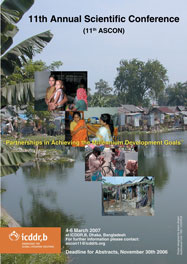 • 11th
Annual Scientific Conference of ICDDR,B to be held
at in Dhaka
• 11th
Annual Scientific Conference of ICDDR,B to be held
at in Dhaka
The 11th Annual Scientific Conference of ICDDR,B
(the 11th ASCON) will be held at the Centre in Dhaka, Bangladesh 4–6
March 2007,
followed by the 40th Anniversary celebrations of the Demographic Surveillance
System (DSS)-Matlab, from 7 to 8 March 2007. The Theme of the Conference
is “Partnership in Achieving the Millennium Development Goals.” Scientists,
health professionals, programme managers, community organizers, and
policy-makers are invited to participate in this forum providing an
opportunity to disseminate and share results of research, experiences,
and lessons learnt from recent research and programmes. The 11th ASCON
will especially concentrate on the Millennium Development Goals (MDG)
No. 1, 4, 5, and 6. Deadline for abstracts has been extended to 30
December 2006.
• Copenhagen conference about Religion
in Security Politics
A
conference about ”Religion
in Security Politics: New Themes and Challenges” will be held
in Copenhagen, Denmark, 29–30 March 2007. The conference,
organised by Ravinder Kaur at the Institute
for Society and Globalisation
(ISG), Roskilde University, and Dietrich Jung at the Danish
Institute for International Studies (DIIS), aims at exploring the construction
of religion, mainly ‘other’ religions that are framed in
violence, as a civilisational threat within the current security politics
discourse; and how security politics is itself being shaped anew through
incursions into fields of theology, sociology, and philosophy that
home religion otherwise. It also aims at exploring the politics of
passion as witnessed in the Middle East and Asia, and also the frequent
use of past traditions, historical events, religious prophecies, myths,
folktales etc. to construct a fluent narrative of the present conflicts
and disagreements. Venue: Auditorium, DIIS, Strandgade 71, Copenhagen. More
information. (as a pdf-file)
• Gavin Flood keynote speaker at Södertörn
conference on religion
A
conference on ”Religion
on the Borders: New Challenges in the Academic Study of Religion” will
be held at Södertörn University College south of Stockholm,
19–22 April 2007. The ambition with the conference is
to gather scholars from different academic disciplines to engage in
discussions on religion and borders in the past and the present, in
theory and in practice. It is organized in collaboration with IAHR
(International Association for the History
of Religions) and SSRF (Swedish Society for the Study of History
of Religions). The Keynote speakers include Professor Gavin Flood,
Academic director at the Oxford Centre
for Hindu Studies and Professor
of Religion, University of Stirling, UK. He will lecture about ”Dwelling
on the Borders: Self, Religious Reading, and the Public Realm”. More
information.
• Papers invited for Oxford Workshop
on Values and Multidimensional Poverty
A Workshop
on Values and Multidimensional Poverty will be held in Oxford, UK,
29–31
May 2007.
This three-day high level launch workshop is organised by the new Oxford
Poverty & Human Development Initiative at Queen Elizabeth House.
OPHI is a research initiative within the Dept.
of International Development, Queen Elizabeth House, University
of Oxford – directed by Sabina Alkire and advised by Nobel Laureate
Amartya Sen (Harvard), Sudhir Anand (Oxford) and Tony Atkinson (Paris).
The workshop will have two main themes: 1. Missing Dimensions of
Human Development; and 2. Interpersonal Comparisons of Poverty
and Well-Being. The ambition is that selected papers will be published
in a special issue of a journal. Interested researchers from the global
South are invited to submit paper abstracts by 15 January 2007. Travel,
accommodation and subsistence at the workshop will be covered for successful
applicants, who will be required to submit a completed paper by 30
April 2007. More
information.
• EADI
workshop in Warsaw about EU – India problems of strategic partnership
 An
International scientific workshop titled ”The
EU – India:
The problems of strategic partnership and its significance for transformations
in the world system” will be held in Warsaw, Poland,
31 May – 2 June 2007. The conference is being planned by the
working group "Transformations in the World System – Comparative
Studies of Development" of EADI, the European Association
of Development Research and Training Institutes (a leading professional
network for development and regional studies in Europe), and be hosted
by Warsaw School of Economics. hosted by Warsaw School of Economics.
The current problems of co-operation between the European Union and
India will be in focus for the workshop. The conveners of the working
group are Victor Krasilshchikov from
the Institute
of World Economy and International Relations, Russian
Academy of Sciences, Moscow, Russian Federation; and Imre
Lévai from the Institute
for Political Science at the Hungarian
Academy of Sciences in Budapest. More
information.
An
International scientific workshop titled ”The
EU – India:
The problems of strategic partnership and its significance for transformations
in the world system” will be held in Warsaw, Poland,
31 May – 2 June 2007. The conference is being planned by the
working group "Transformations in the World System – Comparative
Studies of Development" of EADI, the European Association
of Development Research and Training Institutes (a leading professional
network for development and regional studies in Europe), and be hosted
by Warsaw School of Economics. hosted by Warsaw School of Economics.
The current problems of co-operation between the European Union and
India will be in focus for the workshop. The conveners of the working
group are Victor Krasilshchikov from
the Institute
of World Economy and International Relations, Russian
Academy of Sciences, Moscow, Russian Federation; and Imre
Lévai from the Institute
for Political Science at the Hungarian
Academy of Sciences in Budapest. More
information.
• Imagining
Collectives theme for second Tamil Studies conference
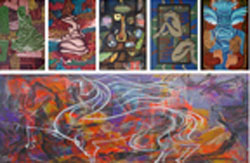 The second annual
Tamil Studies Conference, titled "Imagining
Collectives: Continuities, Changes and Contestations" is held
in Toronto,
Canada, 31 May – 2 June 2007. It is organized by the University
of Toronto and the University of Windsor. Scholars are invited to submit
research papers about the history of the formation, elaboration, transformation,
interpretation and contestation of collectives and identities within
the Tamil speaking regions of Southern India, Sri Lanka and the Diaspora
throughout history and in different scholarly disciplines. More
information.
The second annual
Tamil Studies Conference, titled "Imagining
Collectives: Continuities, Changes and Contestations" is held
in Toronto,
Canada, 31 May – 2 June 2007. It is organized by the University
of Toronto and the University of Windsor. Scholars are invited to submit
research papers about the history of the formation, elaboration, transformation,
interpretation and contestation of collectives and identities within
the Tamil speaking regions of Southern India, Sri Lanka and the Diaspora
throughout history and in different scholarly disciplines. More
information.
• 2007
World Water Week in Stockholm 12–18 August
 The World Water Week is the leading annual global meeting place for capacity-building,
partnership-building and follow-up on the implementation of international processes
and programmes in water and development. Plenary sessions, seminars, workshops,
side events and special activities will take place under the overarching theme "Progress
and Prospects on Water: Striving for Sustainability in a Changing World." The
First Announcement and Call for Abstracts is now available. The abstract submittal
deadline is February 1, 2007. More information.
The World Water Week is the leading annual global meeting place for capacity-building,
partnership-building and follow-up on the implementation of international processes
and programmes in water and development. Plenary sessions, seminars, workshops,
side events and special activities will take place under the overarching theme "Progress
and Prospects on Water: Striving for Sustainability in a Changing World." The
First Announcement and Call for Abstracts is now available. The abstract submittal
deadline is February 1, 2007. More information.
• 36th
Annual Madison Conference on South Asia
 The 36th Annual Conference
on South Asia will be held 11–14 October
2007 in Madison, USA. It is
sponsored by the Center for South Asia at the University of Wisconsin-Madison.
The Annual Conference on South Asia attracts over 500 scholars and
other interested parties annually, featuring 75 or more academic panels
and roundtables, as well as association meetings and special events
ranging from performances to film screenings. Venue: Madison Concourse
Hotel, 1 West Dayton St., Madison More
information.
The 36th Annual Conference
on South Asia will be held 11–14 October
2007 in Madison, USA. It is
sponsored by the Center for South Asia at the University of Wisconsin-Madison.
The Annual Conference on South Asia attracts over 500 scholars and
other interested parties annually, featuring 75 or more academic panels
and roundtables, as well as association meetings and special events
ranging from performances to film screenings. Venue: Madison Concourse
Hotel, 1 West Dayton St., Madison More
information.
• Culture and the Configuring of Security
theme for NIAS conference in Lund
The Second Annual Nordic NIAS Council
(NNC) Conference, titled ”Culture
and the Configuring of Security: Using Asian Perspectives to Inform
Theoretical Direction”, will
be held in Lund, 6–9 November 2007. Researchers (including doctoral
students) and other specialists with particular interest and insights
into Asian security aspects are invited to participate in the conference,
that aims to break new theoretical ground by exploring a plurality
of discourses and practices of security, and discussing ways of theorizing
their embeddedness in social and cultural matrices. It is organised
by the Nordic NIAS Council (NNC), a Nordic network comprising of universities
and research institutions working on Asia, in partnership with Copenhagen
Business School, Copenhagen University and Lund University. More
information.
• Manchester
venue for the 20th ECMSAS conference
 The
20th European Conference on Modern South Asian Studies (ECMSAS) will be
held in Manchester, UK, 8–11
July 2008.
The ECMSAS is the largest gathering of South Asia oriented researchers
in Europe, covering all fields from the humanities and social sciences
to technology, natural sciences and medicine. The conference is held
biannually under the aegis of the European Association of South Asian
Studies (EASAS), a professional, non-profit organisation of scholars
engaged in research and teaching concerning South Asia with regard
to all periods and fields of study. SASNET organised the 18th ECMSAS
conference in Lund in 2004 (more information
about the Lund conference),
and in June 2006, the 19th ECMSAS conference was arranged in Leiden,
the Netherlands (read SASNET’s
report from the Leiden conference). Suggestions for panels at the
2008 conference are now actively considered. The conference will be
hosted by the School of Arts, Histories and Cultures at the University
of Manchester, and draws on the vibrant South Asian Studies programmes
in Humanities and Social Sciences at the University. Go
to the conference web site.
The
20th European Conference on Modern South Asian Studies (ECMSAS) will be
held in Manchester, UK, 8–11
July 2008.
The ECMSAS is the largest gathering of South Asia oriented researchers
in Europe, covering all fields from the humanities and social sciences
to technology, natural sciences and medicine. The conference is held
biannually under the aegis of the European Association of South Asian
Studies (EASAS), a professional, non-profit organisation of scholars
engaged in research and teaching concerning South Asia with regard
to all periods and fields of study. SASNET organised the 18th ECMSAS
conference in Lund in 2004 (more information
about the Lund conference),
and in June 2006, the 19th ECMSAS conference was arranged in Leiden,
the Netherlands (read SASNET’s
report from the Leiden conference). Suggestions for panels at the
2008 conference are now actively considered. The conference will be
hosted by the School of Arts, Histories and Cultures at the University
of Manchester, and draws on the vibrant South Asian Studies programmes
in Humanities and Social Sciences at the University. Go
to the conference web site.
• Other conferences connected to South Asian
studies arranged all over the World
See SASNET’s page, http://www.sasnet.lu.se/conferences.html#conf
Important lectures and workshops
• Purushottama Bilimoria holds guest
lecture at Uppsala University
Professor Purushottama Bilimoria from
the School of International and Political Studies, Deakin University,
Melbourne, Australia, holds a guest lecture at Uppsala University on
Friday 12 January 2007, 10.15. He will lecture about ”Dismantling
Normativity in Indian Ethics – Vedic altarity to the Bhagavadgita
alterity”.
Prof. Bilimoria holds a chair in Philosophy at Deakin University, but
has also been visiting professor at universities in USA and has published
studies on various aspects of Indian culture. Venue: Dept. of Linguistics
and Philology, room 7-0042, Humanistiskt centrum, Engelska parken,
Uppsala. More
information.
• Sheldon
Pollock lectures at Uppsala University
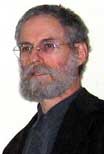 Professor Sheldon Pollock,
Professor of Sanskrit and South Asian Studies, Dept. of Middle East & Asian
Languages and Cultures at Columbia University, USA, holds a lecture at
Uppsala University on Wednesday 24
January 2006, 14.15–16.00. He will talk about ”The
Language of the Gods in the World of Men: Sanskrit, Culture and Power
in Premodern India”, which is also the title of a book recently
published (U. of California Press, 2006). The lecture is organised
by the Swedish Collegium
for Advanced Study (SCAS) in collaboration with the Forum
for Advanced Studies in Arts, Languages and Theology (SALT) and
the South Asia Seminar at Uppsala University. Venue: Library of SCAS,
Linneanum, fourth floor, Thunbergsvägen 2. More
information about Prof. Pollock.
Professor Sheldon Pollock,
Professor of Sanskrit and South Asian Studies, Dept. of Middle East & Asian
Languages and Cultures at Columbia University, USA, holds a lecture at
Uppsala University on Wednesday 24
January 2006, 14.15–16.00. He will talk about ”The
Language of the Gods in the World of Men: Sanskrit, Culture and Power
in Premodern India”, which is also the title of a book recently
published (U. of California Press, 2006). The lecture is organised
by the Swedish Collegium
for Advanced Study (SCAS) in collaboration with the Forum
for Advanced Studies in Arts, Languages and Theology (SALT) and
the South Asia Seminar at Uppsala University. Venue: Library of SCAS,
Linneanum, fourth floor, Thunbergsvägen 2. More
information about Prof. Pollock.
• Swedish Research Council invites to
seminar about World Literature
The Swedish Research Council invites
to a seminar about ”World
Literature – Reading as a Key to Other Cultures”, in
Stockholm on
Thursday 25 January, 10–16. The seminar deals with the understanding
of literature coming from outside the Western culture, a topic also
for the multidisciplinary Swedish research project ”Literary
History: Towards a Global Perspective” that was recently
completed after 10 years, and published by Walter de Gruyter in Berlin & New
York in a set of four volumes. More
information about the research project. Some of the key persons
behind this project, that was funded by the Swedish Research Council,
now participate in the Stockholm seminar, among them Prof. Gunilla
Lindberg-Wada, Dept. of Oriental Languages, Stockholm University; Prof.
Margareta Pettersson, Dept. of Comparative
Literature, Växjö University; and Prof. Bo Utas, Iranian
Languages, Dept. of Linguistics and Philology, Uppsala University.
Another invited speaker is Prof. Sheldon Pollock, Dept. of Middle East & Asian
Languages and Cultures, Columbia University, USA, who will speak about ”Transcultural
Literary History”. Register your participation before Thursday
18 January, by sending an e-mail to Jesper
Wadensjö. Venue: Vetenskapsrådet, Regeringsgatan 56,
Stockholm.
• Stockholm
seminar about how clean
water and sanitation will cut poverty in half by 2015
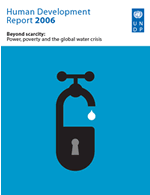 A one-day seminar
entitled ”Water, Power, Poverty – How
clean water and sanitation will cut poverty in half by 2015” will
be arranged in Stockholm on Friday 2 February 2007, 09.30–17.00.
It is organised by the United Nations Development Programme (UNDP) Nordic
Office and the Swedish Water House (SWH) at the Stockholm International
Water Institute. The seminar is a wider follow-up of the launch of
the 2006 Human Development Report, titled ”Beyond Scarcity:
Power, Poverty and the Global Water Crisis”. Besides a large
number of prominent decision- and policy-makers, Dr. Peter Svedberg,
Professor of Development Economics at the Institute
for International Economic Studies, Stockholm University; Mr
Jakob Simonsen, Director for UNDP
Nordic Office in Denmark; and Mr. Anders Berntell, Executive Director
for the Stockholm International Water
Institute (SIWI), are also invited.
The full-day seminar will be divided into three sessions. The first,
with representatives from the United Nations and Governments, feature
a number of presentations along with a moderated discussion on the relationship
between water, sanitation and development. The second session will focus
on possible financing mechanisms for water and sanitation, the associated
macro-economic perspectives as linked to water, and the role of the private
sector in contributing to development. In the final session, the ambition
is to have a moderated discussion with Swedish government representatives
and parliamentarians on Sweden’s response to the challenges presented
in the HDR and in the seminar. Please confirm participation no later
than January 26, 2007 to Michael
Moore. Venue: Stockholm City Conference Centre/Norra Latin. More
information.
A one-day seminar
entitled ”Water, Power, Poverty – How
clean water and sanitation will cut poverty in half by 2015” will
be arranged in Stockholm on Friday 2 February 2007, 09.30–17.00.
It is organised by the United Nations Development Programme (UNDP) Nordic
Office and the Swedish Water House (SWH) at the Stockholm International
Water Institute. The seminar is a wider follow-up of the launch of
the 2006 Human Development Report, titled ”Beyond Scarcity:
Power, Poverty and the Global Water Crisis”. Besides a large
number of prominent decision- and policy-makers, Dr. Peter Svedberg,
Professor of Development Economics at the Institute
for International Economic Studies, Stockholm University; Mr
Jakob Simonsen, Director for UNDP
Nordic Office in Denmark; and Mr. Anders Berntell, Executive Director
for the Stockholm International Water
Institute (SIWI), are also invited.
The full-day seminar will be divided into three sessions. The first,
with representatives from the United Nations and Governments, feature
a number of presentations along with a moderated discussion on the relationship
between water, sanitation and development. The second session will focus
on possible financing mechanisms for water and sanitation, the associated
macro-economic perspectives as linked to water, and the role of the private
sector in contributing to development. In the final session, the ambition
is to have a moderated discussion with Swedish government representatives
and parliamentarians on Sweden’s response to the challenges presented
in the HDR and in the seminar. Please confirm participation no later
than January 26, 2007 to Michael
Moore. Venue: Stockholm City Conference Centre/Norra Latin. More
information.
Swedish Business and Politics related to South Asia
• Amnesty
Business Group watchdog against human rights violations
 Amnesty
Business Group (ABG) in Sweden is part of the Swedish section of Amnesty
International. ABGs vision is that Swedish companies will not violate
human rights, as they are defined in the Universal Declaration on Human
Rights. ABGs aim is to influence and educate Swedish companies to take
their responsibility in respecting and defending human rights wherever
they do business. Swedish companies with international subsidiaries and
international operations risk being involved in human rights violations.
ABG can supply a company specific analysis over the violations that may
occur in various industries and countries, Go to ABGs web page, http://www.amnestybusinessgroup.se/.
Amnesty
Business Group (ABG) in Sweden is part of the Swedish section of Amnesty
International. ABGs vision is that Swedish companies will not violate
human rights, as they are defined in the Universal Declaration on Human
Rights. ABGs aim is to influence and educate Swedish companies to take
their responsibility in respecting and defending human rights wherever
they do business. Swedish companies with international subsidiaries and
international operations risk being involved in human rights violations.
ABG can supply a company specific analysis over the violations that may
occur in various industries and countries, Go to ABGs web page, http://www.amnestybusinessgroup.se/.
• Global Reporting Initiative elevates
sustainability reporting to equivalency with financial reporting
 The
Global Reporting Initiative was initially convened by the Coalition
for Environmentally Responsible Economies (CERES), a non-profit
coalition of over 50 investor, environmental, religious, labour and social
justice groups. The GRI was established in 1997 with a mission to elevate
sustainability reporting to equivalency with financial reporting. It
has recently been established as an organisation in its own right. GRI’s
vision is that reporting on economic, environmental, and social performance
by all organizations becomes as routine and comparable as financial reporting.
GRI accomplishes this vision by developing, continually improving, and
building capacity around the use of its Sustainability Reporting Framework.
An international network of thousands from business, civil society, labor,
and professional institutions create the content of the Reporting Framework
in a consensus-seeking process. Go to its web site, http://www.globalreporting.org/
The
Global Reporting Initiative was initially convened by the Coalition
for Environmentally Responsible Economies (CERES), a non-profit
coalition of over 50 investor, environmental, religious, labour and social
justice groups. The GRI was established in 1997 with a mission to elevate
sustainability reporting to equivalency with financial reporting. It
has recently been established as an organisation in its own right. GRI’s
vision is that reporting on economic, environmental, and social performance
by all organizations becomes as routine and comparable as financial reporting.
GRI accomplishes this vision by developing, continually improving, and
building capacity around the use of its Sustainability Reporting Framework.
An international network of thousands from business, civil society, labor,
and professional institutions create the content of the Reporting Framework
in a consensus-seeking process. Go to its web site, http://www.globalreporting.org/
• Tetra
Pak engaged in dairy and milk distribution
projects in South Asia
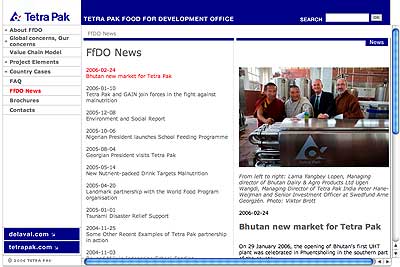 The
Swedish company Tetra Pak is a world leader in processing and packaging
of liquid foods, with activities in more than 165 countries worldwide. Through
its Food for Development Office (FfDO), Tetra Pak is also engaged in promoting
sustainable economic and social development is by building strong partnerships
between governments, private industry, non-governmental organisations (NGOs),
international and national development agencies. Together with Tetra Pak’s
sister company 'DeLaval', the FfDO also participates in integrated agricultural
development projects addressing the entire food value chain from "cow
to consumer".
In South Asia FfDO has been engaged in dairy and
milk distribution projects in Afghanistan, Bangladesh, Bhutan,
India and Pakistan.
A year ago, on 29 January 2006, the opening of Bhutan’s first
UHT plant was celebrated in Phuentsholing in the southern part
of the country where Bhutan Dairy & Agro Products Ltd will
market UHT milk packed in Tetra Brik Aseptic, partly based on raw
milk from Bhutanese farmers (more
information about the Bhutan project). Tetra Pak has been
instrumental in bringing together financial partners, including
Swedish risk capital company Swedfund International and Tetra Laval
Credit. Arne Georgzén, Senior Investment
Officer at Swedfund
International says: ”This is one of the very first industrial
investments in Bhutan that have been financed mainly by international
capital, with the exception of a few hotels and hydropower plants.” More
information about Tetra Pak’s Food for Development Office.
The
Swedish company Tetra Pak is a world leader in processing and packaging
of liquid foods, with activities in more than 165 countries worldwide. Through
its Food for Development Office (FfDO), Tetra Pak is also engaged in promoting
sustainable economic and social development is by building strong partnerships
between governments, private industry, non-governmental organisations (NGOs),
international and national development agencies. Together with Tetra Pak’s
sister company 'DeLaval', the FfDO also participates in integrated agricultural
development projects addressing the entire food value chain from "cow
to consumer".
In South Asia FfDO has been engaged in dairy and
milk distribution projects in Afghanistan, Bangladesh, Bhutan,
India and Pakistan.
A year ago, on 29 January 2006, the opening of Bhutan’s first
UHT plant was celebrated in Phuentsholing in the southern part
of the country where Bhutan Dairy & Agro Products Ltd will
market UHT milk packed in Tetra Brik Aseptic, partly based on raw
milk from Bhutanese farmers (more
information about the Bhutan project). Tetra Pak has been
instrumental in bringing together financial partners, including
Swedish risk capital company Swedfund International and Tetra Laval
Credit. Arne Georgzén, Senior Investment
Officer at Swedfund
International says: ”This is one of the very first industrial
investments in Bhutan that have been financed mainly by international
capital, with the exception of a few hotels and hydropower plants.” More
information about Tetra Pak’s Food for Development Office.
•
India Business Forum to be held in Stockholm
 An
India Business Forum will be arranged in Stockholm in April 2007. It
is organised by Globe Forum, a Stockholm based company established in
2000. Behind it stands a group of professionals who believe in building
strong relationships by bringing people and companies together. Its world-wide
network includes some of the most prominent business leaders in the world;
people with extensive experience in their respective fields of business.
The 2007 India Business Forum will provide participants opportunities
to interact and network with corporate leaders and gain further insight
into the Indian market. The aim of the forum will be to increase the
knowledge on business opportunities and business climate developments
in India for Nordic companies, and to create a Nordic platform for exchange
of business knowledge about India.
An
India Business Forum will be arranged in Stockholm in April 2007. It
is organised by Globe Forum, a Stockholm based company established in
2000. Behind it stands a group of professionals who believe in building
strong relationships by bringing people and companies together. Its world-wide
network includes some of the most prominent business leaders in the world;
people with extensive experience in their respective fields of business.
The 2007 India Business Forum will provide participants opportunities
to interact and network with corporate leaders and gain further insight
into the Indian market. The aim of the forum will be to increase the
knowledge on business opportunities and business climate developments
in India for Nordic companies, and to create a Nordic platform for exchange
of business knowledge about India.
• Amnesty Business Group organised
Business Forum in November
Another
Business Forum focusing on India: ”Företag,
Indien & Mänskliga Rättigheter – hur blir ditt
företag en del av lösningen” (Private
companies, India
& human rights – how can your company be part of the solution?)
was held in Stockholm on 15 November 2006. Representatives from Amnesty
Business Group (ABG) – organiser of the forum; the International
law firm Bird & Bird; KPMG Bohlins AB; and Banco Fonder, made presentations
on related issues. Read a report from the
Business Forum by Nina Virkkala, trainee at ABG (as a pdf-file, in
Swedish only).
• More information about South Asia related
business and politics in Sweden
See SASNET’s page, http://www.sasnet.lu.se/polbuss.html
South Asia related culture in greater Scandinavia
•
Malayalee film only South Asian contribution at the Göteborg
Film Festival
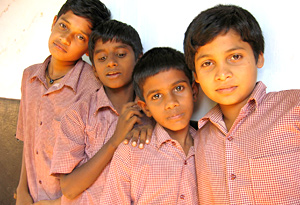 The 2007 Göteborg International Film
Festival starting
on Friday 26 January (and lasting to Sunday 5 February), has only
one South Asian film on show. It is the Malayalee film ”Life
Is All About Friends” (photo from the
film to the right)
directed by Murali Nairi. More
information on the film.
The 2007 Göteborg International Film
Festival starting
on Friday 26 January (and lasting to Sunday 5 February), has only
one South Asian film on show. It is the Malayalee film ”Life
Is All About Friends” (photo from the
film to the right)
directed by Murali Nairi. More
information on the film.
•
Fourth Himalayan Film Festival to be held in Amsterdam
The fourth
Himalayan Film Festival organised by the Himalayan
Archive Foundation The Netherlands, will be held 10–11
February 2007 in Amsterdam.
The general aim of the Himalayan Film Festival is to promote documentary
cinema and to give credit to films or videos dealing with the Himalayan
region in a wide sense of the term. A large number of movies & documentaries
from all over the world featuring the Himalayan region will be
screened. The ‘Himalayan lecture’ on the fourth Himalaya
Film Festival will be given by the eminent Nepalese journalist
Mr Kanak Mani Dixit. Venue: De Griffioen, Cultural Centre of the
Free University of Amsterdam, Uilenstede 106, Amstelveen. More
information.
• More information about South Asia related
culture in Scandinavia
See SASNET’s page, http://www.sasnet.lu.se/culture.html
New and updated items on SASNET web site
• Swedish departments where research
on South Asia is going on:
Constantly added to the list of research environments at Swedish
universities, presented by SASNET. The full list now includes 200 departments,
with detailed descriptions of the South Asia related research and education
taking place! Go
to http://www.sasnet.lu.se/environment.html
ƒ Center for Infectious Medicine (CIM), Department of Medicine at the Karolinska University Hospital in Huddinge, Karolinska Institutet Medical University, Stockholm
ƒ Division of Thermal Power Engineering, Department of Energy Sciences, Lund Institute of Technology, Lund University
ƒ Forum for Central Asian Studies (FoCAS), Dept. of Oriental Languages, Stockholm University
ƒ Central Asia-Caucasus Institute & Silk Road Studies Program, Uppsala University (in collaboration with Johns Hopkins University, USA)
ƒ Condensed Matter Theory Group, Dept. of Physics, Uppsala University
Best regards,
Staffan Lindberg Lars Eklund
SASNET/ Swedish South Asian Studies Network
SASNET is a national network
for research, education, and information about South Asia, based at Lund
University. The aim is to encourage and promote an open and dynamic networking
process, in which Swedish researchers co-operate with researchers in South
Asia and globally.
The network is open to all sciences. Priority is given to co-operation
between disciplines and across faculties, as well as institutions in the
Nordic countries and in South Asia. The basic idea is that South Asian
studies will be most fruitfully pursued in co-operation between researchers,
working in different institutions with a solid base in their mother disciplines.
The network is financed by Sida (Swedish
International Development Cooperation Agency) and by Lund
University.
Postal address: SASNET – Swedish South Asian Studies Network,
Scheelevägen 15 D, SE-223 70 Lund, Sweden
Visiting address: Ideon Research Park, House Alfa 1 (first floor,
room no. 2040), in the premises of the Centre for East and South East
Asian Studies at Lund University (ACE).
Phone: + 46 46 222 73 40
Fax: + 46 46 222 30 41
E-mail: sasnet@sasnet.lu.se
Web site:
http://www.sasnet.lu.se
Staff: Staffan
Lindberg, director/coordinator & Lars
Eklund, webmaster/deputy director
SASNET - Swedish South Asian Studies Network/Lund
University
Address: Scheelevägen 15 D, SE-223 70 Lund, Sweden
Phone: +46 46 222 73 40
Webmaster: Lars Eklund
Last updated
2011-04-08